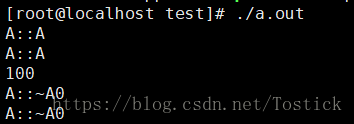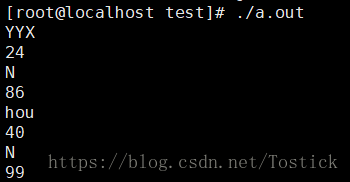https://blog.csdn.net/Tostick/article/details/80685482
public 所有均可访问
private 类自己的成员函数访问,不能被类对象访问
protected 类自己以及子类访问,不能被类对象访问
friend 友元,别人是你的朋友,他可以访问我的东西。(但不是我可以访问他的东西)
友元关系不能被继承。
友元关系是单向的,不具有交换性。若类B是类A的友元,类A不一定是类B的友元,要看在类中是否有相应的声明。
友元关系不具有传递性。若类B是类A的友元,类C是B的友元,类C不一定是类A的友元,同样要看类中是否有相应的申明
友元函数并不是类的成员函数,因此在类外定义的时候不能加上class::function name
例子1
#include <iostream> using namespace std; class A { private: int i; public: A() {i = 0; cout <<"A::A"<<endl; } ~A() {i = 0; cout <<"A::~A"<<i<<endl; } void set(int i) {this->i = i;} void g(A *q) { cout << q->i << endl; } }; int main () { A a; A b; b.set(100); a.g(&b); // 使用对象a的成员函数访问对象b中的私有变量i,则不能通过对象直接访问 return 0; }
结果

备注:
private,protected限制编译时刻检查,而不是运行检查。一直编译成二进制,则不再受到此限制。
struct 缺省权限是public, class缺省权限是private
C++中,只有成员变量很简单数量少才可能使用struct;一般使用class
例子2-protected
#include <iostream> using namespace std; class A { public: int a = 1; private: int b = 2; protected: int c = 3; }; class B: public A { public: void func() { std::cout << A::a << std::endl; // 可通过A类访问公有变量 // std::cout << A::b << std::endl; // 不能在B类中通过A类访问私有变量 std::cout << A::c << std::endl; // 可通过A类访问保护变量 } }; int main() { B b; A a; cout << b.a << a.a << endl; // 可通过A类变量访问共有变量 // cout << b.c << a.c << endl; // 不可通A过类变量访问保护变量 return 0; }

注:
类中省略public 等时,默认是private属性
继承基类, 在基类前省略public 等时, 默认是protected属性
例子3-友元函数,外部调用可访问类的变量和方法
#include <iostream> #include <math.h> using namespace std; class Point { public: Point(double xx, double yy) { x=xx; y=yy; } //默认构造函数 void Getxy(); //公有成员函数 friend double Distance(Point &a, Point &b); //友元函数 private: double x, y; int key = 101; public: int kk = 102; }; void Point::Getxy() { cout<<key<<endl; // 函数定义中访问私有变量 } double Distance(Point &a, Point &b) // 友元定义,注意函数名前未加类声明符 { double dx = a.x - b.x; double dy = a.y - b.y; return sqrt(dx*dx+dy*dy); } int main() { Point p1(3.0, 4.0), p2(6.0, 8.0); p1.Getxy(); // cout << p2.key << endl; 不能访问私有变量 // cout << Point::key << endl; 不能访问非静态变量 cout << p2.kk << endl; double d = Distance(p1, p2); // 友元访问 cout<<"Distance is: "<<d<<endl; return 0; }
结果:

例子4-友元类,外部调用可访问类的变量和方法
当一个类作为另一个类的友元时,它的所有成员函数都是另一个类的友元函数,都可以访问另一个类的私有或者公有成员
友元作为参数与使用类指针作为参数的区别在于,友元可以访问类的私有成员
#include <iostream> #include <cstring> using namespace std ; //声明教师类 class Techer ; //学生类 class Student { private: string name ; int age ; char sex ; int score ; public : Student(string name , int age , char sex , int score); void stu_print(Techer &tech); }; //教师类 class Techer { private: string name ; int age ; char sex ; int score ; public : Techer(string name , int age , char sex , int score); //声明一个友元类 friend Student ; }; //Student类的构造函数的实现 Student::Student(string name , int age , char sex , int score) { this->name = name ; this->age = age ; this->sex = sex ; this->score = score ; } //Techer类的构造函数的实现 Techer::Techer(string name , int age , char sex , int score) { this->name = name ; this->age = age ; this->sex = sex ; this->score = score ; } //打印Student类中的私有成员和Techer的私有成员 void Student::stu_print(Techer &tech) { //用this指针访问本类的成员 cout << this->name << endl ; cout << this->age << endl ; cout << this->sex << endl ; cout << this->score << endl ; //访问Techer类的成员 cout << tech.name << endl ; cout << tech.age << endl ; cout << tech.sex << endl ; cout << tech.score << endl ; } int main(void) { Student stu1("YYX",24,'N',86); Techer t1("hou",40,'N',99); stu1.stu_print(t1); return 0 ; }
结果

备注:
运算符重载经常使用friend
friend写在类声明中,一旦类实现完成,则不能再添加friend
friend的授权在编译期
---------------------
作者:gocgocgo
来源:CSDN
原文:https://blog.csdn.net/Tostick/article/details/80685482
版权声明:本文为博主原创文章,转载请附上博文链接!